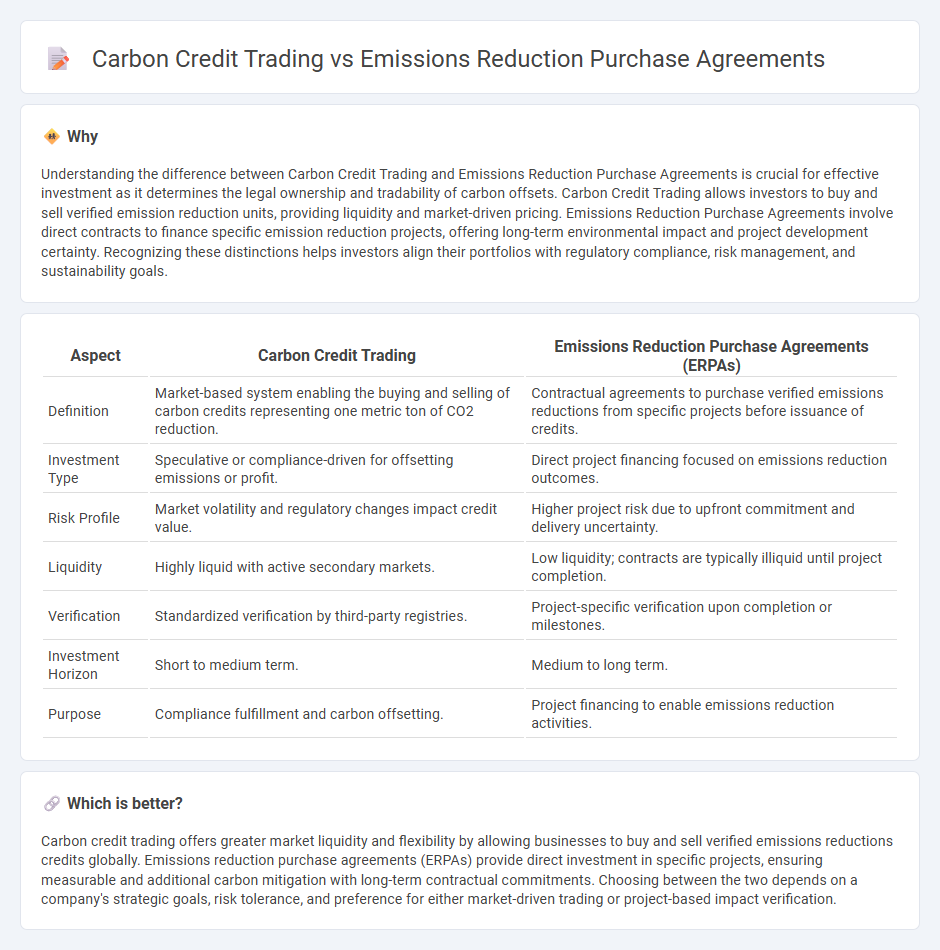
Carbon credit trading enables companies to buy and sell verified emission permits, creating a market-driven approach to meeting environmental targets. Emissions reduction purchase agreements (ERPAs) involve direct contracts for projects that reduce greenhouse gases, providing a more hands-on investment in sustainability initiatives. Explore the differences and benefits of these mechanisms to optimize your carbon investment strategy.
Why it is important
Understanding the difference between Carbon Credit Trading and Emissions Reduction Purchase Agreements is crucial for effective investment as it determines the legal ownership and tradability of carbon offsets. Carbon Credit Trading allows investors to buy and sell verified emission reduction units, providing liquidity and market-driven pricing. Emissions Reduction Purchase Agreements involve direct contracts to finance specific emission reduction projects, offering long-term environmental impact and project development certainty. Recognizing these distinctions helps investors align their portfolios with regulatory compliance, risk management, and sustainability goals.
Comparison Table
| Aspect | Carbon Credit Trading | Emissions Reduction Purchase Agreements (ERPAs) |
|---|---|---|
| Definition | Market-based system enabling the buying and selling of carbon credits representing one metric ton of CO2 reduction. | Contractual agreements to purchase verified emissions reductions from specific projects before issuance of credits. |
| Investment Type | Speculative or compliance-driven for offsetting emissions or profit. | Direct project financing focused on emissions reduction outcomes. |
| Risk Profile | Market volatility and regulatory changes impact credit value. | Higher project risk due to upfront commitment and delivery uncertainty. |
| Liquidity | Highly liquid with active secondary markets. | Low liquidity; contracts are typically illiquid until project completion. |
| Verification | Standardized verification by third-party registries. | Project-specific verification upon completion or milestones. |
| Investment Horizon | Short to medium term. | Medium to long term. |
| Purpose | Compliance fulfillment and carbon offsetting. | Project financing to enable emissions reduction activities. |
Which is better?
Carbon credit trading offers greater market liquidity and flexibility by allowing businesses to buy and sell verified emissions reductions credits globally. Emissions reduction purchase agreements (ERPAs) provide direct investment in specific projects, ensuring measurable and additional carbon mitigation with long-term contractual commitments. Choosing between the two depends on a company's strategic goals, risk tolerance, and preference for either market-driven trading or project-based impact verification.
Connection
Carbon credit trading facilitates the buying and selling of emission allowances, incentivizing companies to reduce their carbon footprint through market-driven mechanisms. Emissions Reduction Purchase Agreements (ERPAs) are contracts that ensure the delivery of verified emission reductions, providing a reliable source of carbon credits for trading markets. This connection enables financial support for sustainable projects while promoting transparency and accountability in achieving global emission reduction targets.
Key Terms
Offset Projects
Emissions reduction purchase agreements (ERPAs) secure direct investment in offset projects by committing buyers to purchase verified carbon offsets at a predetermined price, ensuring project funding and emission reductions. Carbon credit trading allows companies to buy and sell existing credits on secondary markets, offering flexibility but with less direct support to project developers. Explore the nuances between these mechanisms to optimize your carbon offset strategy.
Allowances
Emissions Reduction Purchase Agreements (ERPAs) involve direct contracts for buying verified emissions reductions, while carbon credit trading primarily deals with allowances issued by regulatory bodies to permit a specific amount of emissions. Allowances function as tradable permits under cap-and-trade systems, representing legal rights to emit carbon dioxide, whereas ERPAs secure reductions external to these compliance mechanisms. Explore how allowances impact market dynamics and compliance strategies to deepen your understanding.
Additionality
Emissions Reduction Purchase Agreements (ERPAs) guarantee additionality by funding projects that directly reduce greenhouse gas emissions beyond business-as-usual scenarios. Carbon credit trading allows companies to buy and sell verified emission reductions but faces challenges in proving additionality due to market variability and project overlap. Explore how additionality is evaluated in these mechanisms to optimize your climate strategy.
Source and External Links
ERPA General Conditions - Forest Carbon Partnership Facility - ERPAs are legal contracts governing the sale and transfer of verified emission reductions (carbon credits), outlining roles, payment, risk management, and operational policies for carbon programs, especially in REDD+ contexts.
Emission Reduction Purchase Agreement (ERPA) - ODI - ERPAs formalize the responsibilities, rights, and risk management between buyers and sellers of carbon credits, including option types like Call Options that give buyers a right but not obligation to purchase emissions reductions at a fixed future price.
IETA Publishes Trading Documents for Carbon Reductions and Removals - The International Emissions Trading Association has released standardized ERPA templates to promote transparent, reliable legal frameworks for voluntary and compliance carbon credit markets globally.
 dowidth.com
dowidth.com